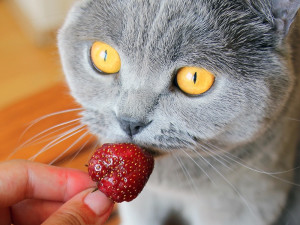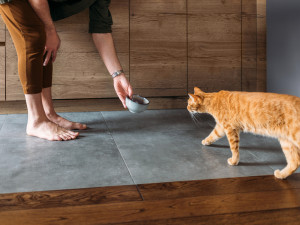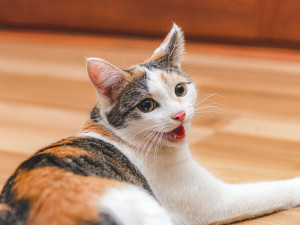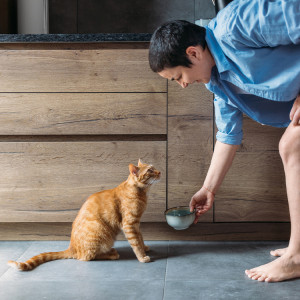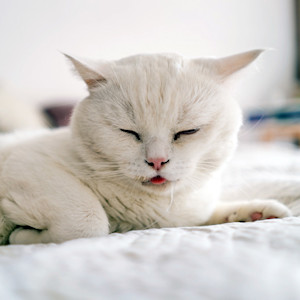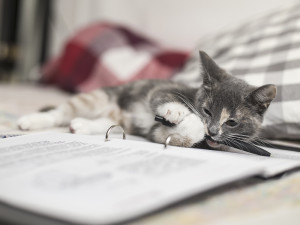Can My Cat Safely Enjoy Watermelon?
Yes, the summertime staple is on the list of safe foods for cats
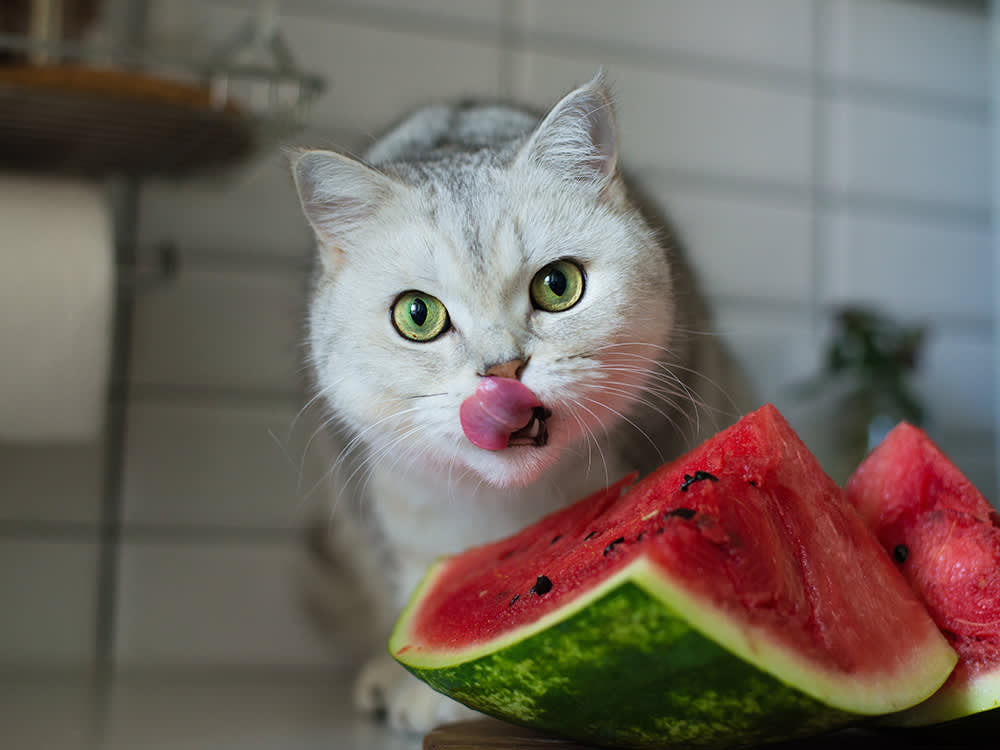
Share Article
Almost no fruit is quite as synonymous with summer as watermelon – a delicious treat that offers hydration and a healthy snack for those hot days. But what if your cat wants a bite, too (and begs for it with big, sweet eyes)? Can cats eat watermelon or should this snack be for humans only?
Find out whether cats can eat watermelon, the risks of feeding this tasty summer fruit to your cat, and whether its nutritional benefits can help your cat live a healthier life, too.
Can my cat eat watermelon?
Watermelon contains tons of vitamins and nutrients, including vitamin A, potassium and lycopene. It’s also very high in water content – with water making up 90 percent of the fruit’s composition – which helps boost hydration to beat the heat in summer. But can cats eat watermelon, and is watermelon safe for cats to consume?
The short answer: yes! Watermelon isn’t toxic to cats, so don’t fret if your cat snatches a few pieces from the picnic table or you want to share a sweet slice. This fruit is perfectly safe as a small treat for your feline companion, as long as you offer it in small, bite-sized pieces and only feed the watermelon flesh to your cat.
How much watermelon can I give my cat?
You might like to eat watermelon straight from the rind, but Dr Autumn Vetter, clinical assistant professor at the University of Georgia Pet Center, says it’s best to cut the fruit into bite-sized pieces for your cat, as big chunks of melon are a potential choking hazard. But when fed safely, for a cat, melon can be a tasty and hydrating treat.
As with any treat or special snack, you should follow the 10 percent rule: treats should only make up 10 percent of your cat’s diet. The other 90 percent should come from a complete and balanced cat food. And avoid giving watermelon to kittens, who need a more specific diet.
What happens if a cat eats too much watermelon?
Even foods that are technically safe for your cat to consume could have unexpected results. When feeding your cat any new food, be on the lookout for any signs of gastrointestinal distress and try out the food in small portions. Too much watermelon could cause stomach upset, vomiting and diarrhoea. If your cat wants a bite of watermelon, offer them small amounts and watch for potential reactions.
Is watermelon bad for cats? Generally, no, but some cats may have problems processing the carbs and sugars in watermelon, so if your cat has a poor reaction to this fruit, take it off the snack list.
What are the potential risks of feeding watermelon to cats?
Watermelon is low in calories and safe for cats to eat, but that doesn’t mean it should be part of their daily diet. Cats are obligate carnivores, and watermelon lacks protein, taurine, and other essential nutrients that cats need to live. So, it’s OK as a snack but should never be used as a replacement for a complete and balanced meal.
Cats shouldn’t eat watermelon rinds, as they’re difficult to digest and could cause gastrointestinal obstruction if your cat swallows a chunk of rind. “The rind of watermelon, much like apple peels and the other outside parts of fruits and veggies, are what get exposed to pesticides during the growing process,” says Dr Vetter. “Even when we wash our fruits and veggies well, who’s to say we can get everything off?”
It’s also important to remove the seeds before giving your cat watermelon; while they aren’t toxic, Dr Vetter warns that watermelon seeds could pose a choking hazard. When it comes to feeding the various parts of a watermelon, Dr Vetter notes, “A good rule of thumb to follow is, ‘If we don’t eat it, they shouldn’t eat it.’”
You should also avoid giving watermelon to overweight cats or those with diabetes, because the naturally occurring sugars in the fruit could lead to further health issues. Even if your cat is healthy, remember that fruit isn’t a natural part of a cat’s diet and can lead to stomach upset.
Other fruits cats can eat
Watermelon isn’t the only fruit that cats can safely eat. In fact, there are plenty of options if you’re looking for healthy snacks to share with your feline. Strawberries are a tasty treat to enjoy with your cat, while apples and bananas can also be healthy and delicious options. Just make sure to do your research and learn how to properly prepare fruit – or any food – before feeding it to your cat.
Frequently asked questions
How should I introduce watermelon to my cat?
If you want to let your cat try watermelon, make sure to thoroughly wash the flesh of the fruit in water and remove the seeds and rind to eliminate possible choking hazards. Chop the melon into small, bitesize pieces before feeding them to your cat. If your cat enjoys watermelon, only give them a small piece as an occasional treat. Never give your cat the rind of the watermelon, which can be difficult for them to chew and digest, and may even cause choking, intestinal blockages or stomach upset.
Why do cats like watermelon?
Wait, do cats like watermelon? Some cats love this fruit, while others don’t care for it all. Cats don’t have the taste glands required to enjoy sweets, so they likely don’t enjoy the taste of watermelon but instead like the moisture and texture of the fruit.
What are some safe alternatives to watermelon for cats?
Unlike most fruits, vegetables are a healthy treat for cats and can actually serve as a positive nutritional addition to their diet. Choose cat-safe veggies like celery, zucchini, green bell peppers, carrots, peas, spinach, broccoli and pumpkin to try with your cat. As always, you can also stick to high-quality cat treats as an alternative to watermelon and other human foods.
Note: while caution was taken to give safe recommendations and accurate instructions in this article, it is impossible to predict an individual cat’s reaction to any food or ingredient. Readers should consult their vets and use personal judgement when applying this information to their own cats’ diets.
References

Jodi Helmer
Jodi Helmer is a North Carolina-based freelance writer who shares her home with an embarrassing number of rescue dogs and relies on four feral cats to patrol the barn. When she isn’t refilling food and water dishes, Jodi writes about animals for Scientific American, Sierra, WebMD, AKC Family Dog, Living the Country Life, and Out Here.

Savannah Admire
Savannah Admire is a writer, poet, and pet mom to three dogs and a cat. She currently lives in Western Maryland. When she’s not writing, you can find her reading, taking photos, or volunteering as a content creator for her local community theatre. Her debut poetry book, Mother Viper, is forthcoming on August 12, 2025.
Related articles
![Person with short hair putting water bowl on floor for cat]()
8 Ways to Get a Cat to Drink Water
Their desert-dwelling roots might resist hydration, but these tricks can help
![Profile view of a man giving a cat food to eat]()
Why Is My New Cat Not Eating?
A veterinary nutritionist explains the causes, signs and treatment for how to increase their appetite
![white cat with eyes closed drooling]()
Dogs Rule, Cats Drool, Right?
Sometimes it works the other way round – here’s why your cat is drooling
![A cat laying on a binder chewing on a pen.]()
Why Does My Cat Eat Plastic?
If your cat nibbles on pen caps and power cords, they could be bored...

